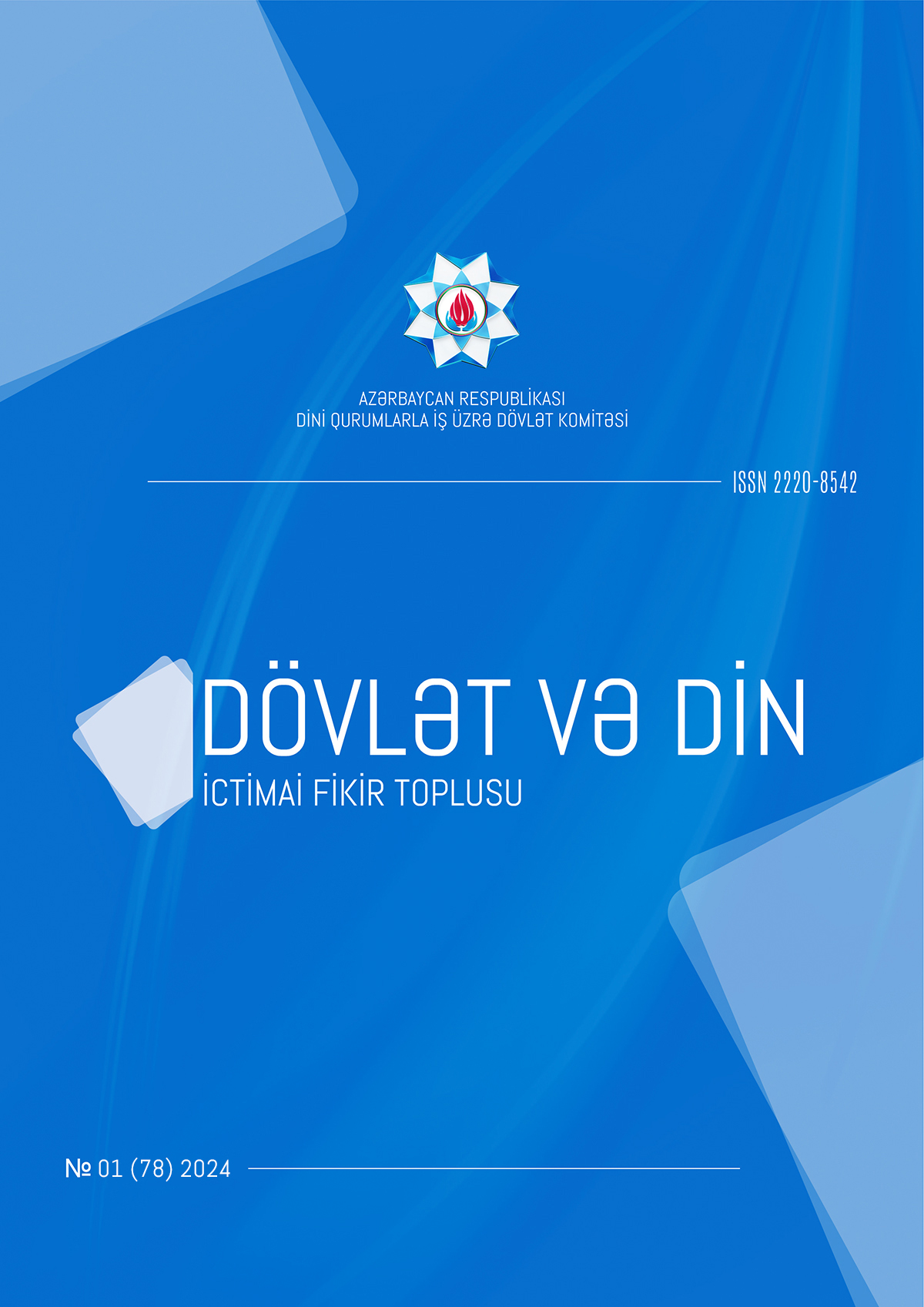DİNİN DÜNYA SİYASƏTİNDƏ YENİDƏN MEYDANA GƏLMƏSİ
Bahlul Aliyev | bahlulaliev@bk.ru
Türkiye Cumhuriyeti İstanbul Gelişim ÜniversitesiZeki Arslantürk | zakiturk@mail.ru
Doğuş Üniversitesi Fen Edebiyat Fakültesi Sosyoloji Bölümü öğretim üyesiCəmiyyət və mənəviyyat
XÜLASƏ
Bəşəriyyət tarixində din cəmiyyətin sosio-politik inkişafında hər zaman güclü faktor olmuşdur. Müzəffər qloballaşma yürüşünün dünyada dinin rolunu azaltması və dinin ictimai varlığın kənarına sıxışdırılması düşüncəsi ilə dini kimlik dünyanın sosial inkişafının idealları da daxil olmaqla həqiqi sosial münasibətlər aləmində həyata keçməyən ümidlərin və istəklərin bir ifadəsi halına gəlir. Beləcə, din istiqrarlı şəkildə əleyhinə çıxdığı qloballaşma problemlərinin həllində aktiv rol alır. Ümumiyyətlə, qarışıq üfüqi və institusional əlaqələr sisteminə malik olan din faktoru birləşdirici bir ideya və qlobal tendensiyaları nizama salmaq üçün effektiv bir vasitə kimi görülməkdədir. Bu məqalədə dünya siyasətində dini aktorların təsirləri restavrativ dini narrativ nəzərindən tədqiq olunmuşdur
ƏDƏBİYYAT
1. Shurıye, A.O. “The Failed Assumptions of Some Social Scientists on the Role Of Religion In International Relations” // International Journal Of Humanities And Social Science, c. 1, sy. 3, s. 11-17, 2011.
2. Wılson, E. After Secularism: Rethinking Religion in Global Politics. Basingstoke, UK: Palgrave Macmillan, 2012.
3. Skınner, Q. The Foundations of Modern Political Thought. Cambridge: Cambridge University Press, 1978.
4. Held, D. Democracy and Global Order. Cambridge, New York: Cambridge University Press, 1995.
5. May, S., Wılson, E.K., Baumgart-Ochse, C. & Sheıkh, F. “The Religious as Political and the Political as Religious: Globalisation, Post-Secularism and the Shifting Boundaries of the Sacred” // Politics, Religion & Ideology, c. 15, sy. 3, s. 331-346, 2014.
6. Cavanaugh, W. “‘A Fire Strong Enough to Consume the House’: The Wars of Religion and the Rise of the State” // Modern Theology, c. 11, sy. 4, s. 397-420, 1995.
7. Casanova, J. “The Secular, Secularizations, Secularisms”. Rethinking Secularism, Ed. C. Calhoun, M. Juergensmeyer ve J. VanAntwerpen. Oxford: Oxford University Press, 2011.
8. Mavellı, L. “Security and Secularization in International Relations” // European Journal of International Relations, c. 18, sy. 1, s. 177-199, 2012.
9. Pabst, A. “The Secularism of Post-Secularity: Religion, Realism, and The Revival Of Grand Theory in IR” // Review of International Studies, c. 38, sy. 5, s. 995-1017, Aralık 2012.
10. Zonova, T. “Svetskie Religii i Diplomaticheskaya Kontseptsiya Balansa Sil” // Sravnitelnaya Politika (Comparative Politics), c. 2, sy. 4, s. 45-49, 2011.
11. Anderson, B. Imagined Communities. Reflections on the Origin and Spread of Nationalism. Moskova: Kanon-Press, 2001.
12. Mıtrofanova, A. “Religioznıy Faktor v Mirovoy Politike i Problema ‘Tsivilizatsiy’” // Vek Globalizatsii, sy. 1, s. 109-120, 2008.
13. Schwarz, T.B. and Lynch, C. “Religion in International Relations”. Oxford Research Encyclopedia of Politics, Kasım 2016 / URL: (erişim tarihi 15.03.2018) http://politics.oxfordre.com/view/10.1093/acrefore/9780190228637.001.0001/acrefore9780190228637-e-122#acrefore-9780190228637-e-122-div1-6
14. Wallace, R.M. “Progress, Secularization And Modernity: The Löwith-Blumenberg Debate”. New German Critique, 22, s. 63-79, 1981.
15. Lındsay, J. “Learning from their Mistakes: Some Implications of International Relations Scholarship for the Study of Religion” // Journal of Contemporary Religion, c. 29, sy. 2, s. 203-218, 2014.
16. Levıne, D.H., Stoll, D. “Bridging the Gap Between Empowerment and Power in Latin America”, Transnational religion and fading states, Der. S. Rudolph, J. Piskatori. Boulder: Westview, 1997.
17. STOLOW, J. “Transnationalism and the new religio-politics. Reflections on a Jewish Orthodox case” // Theory, Culture, & Society, c. 21, sy. 2, s. 109-137, 2004.
18. Haynes, J. “Religion in Foreign Policy”. Oxford Research Encyclopedia of Politics. DOI: 10.1093/acrefore/9780190228637.013.380 / 2017, Temmuz
19. Hopgood, S. & Vınjamurı, L. “Faith in markets”, Sacred aid: Faith and humanitarianism, Ed. Michael Barnett & Janice Gross Stein. Oxford: Oxford University Press, 2012.
RESURGENCE OF RELIGION TO GLOBAL POLITICS
Bahlul Aliyev | bahlulaliev@bk.ru
Türkiye Cumhuriyeti İstanbul Gelişim ÜniversitesiZaki Arslanturk | zakiturk@mail.ru
Doğuş Üniversitesi Fen Edebiyat Fakültesi Sosyoloji Bölümü öğretim üyesiSociety and spirituality
SUMMARY
Throughout human history, religion has always been a powerful factor in the socio-political development of society. The triumphant march of globalization has diminished the role of religion in the world and, with the idea of pushing religion to the edge of social existence, religious identity becomes an expression of hope and aspirations that do not occur in the real world of social relations, including the ideals of social development of the world. Thus, religion assumes an active role in solving the problems of globalization, which it consistently opposes. Often, the phenomenon of religion, which has a complex system of horizontal ties and institutional relations, is seen as a unifying principle and can be an effective tool to regulate global trends. In this study, the effects of religious actors in world politics are examined in the context of increasing religious restorative discourse in social sciences
REFERENCE LIST
1. Shurıye, A.O. “The Failed Assumptions of Some Social Scientists on the Role Of Religion In International Relations” // International Journal Of Humanities And Social Science, c. 1, sy. 3, s. 11-17, 2011.
2. Wılson, E. After Secularism: Rethinking Religion in Global Politics. Basingstoke, UK: Palgrave Macmillan, 2012.
3. Skınner, Q. The Foundations of Modern Political Thought. Cambridge: Cambridge University Press, 1978.
4. Held, D. Democracy and Global Order. Cambridge, New York: Cambridge University Press, 1995.
5. May, S., Wılson, E.K., Baumgart-Ochse, C. & Sheıkh, F. “The Religious as Political and the Political as Religious: Globalisation, Post-Secularism and the Shifting Boundaries of the Sacred” // Politics, Religion & Ideology, c. 15, sy. 3, s. 331-346, 2014.
6. Cavanaugh, W. “‘A Fire Strong Enough to Consume the House’: The Wars of Religion and the Rise of the State” // Modern Theology, c. 11, sy. 4, s. 397-420, 1995.
7. Casanova, J. “The Secular, Secularizations, Secularisms”. Rethinking Secularism, Ed. C. Calhoun, M. Juergensmeyer ve J. VanAntwerpen. Oxford: Oxford University Press, 2011.
8. Mavellı, L. “Security and Secularization in International Relations” // European Journal of International Relations, c. 18, sy. 1, s. 177-199, 2012.
9. Pabst, A. “The Secularism of Post-Secularity: Religion, Realism, and The Revival Of Grand Theory in IR” // Review of International Studies, c. 38, sy. 5, s. 995-1017, Aralık 2012.
10. Zonova, T. “Svetskie Religii i Diplomaticheskaya Kontseptsiya Balansa Sil” // Sravnitelnaya Politika (Comparative Politics), c. 2, sy. 4, s. 45-49, 2011.
11. Anderson, B. Imagined Communities. Reflections on the Origin and Spread of Nationalism. Moskova: Kanon-Press, 2001.
12. Mıtrofanova, A. “Religioznıy Faktor v Mirovoy Politike i Problema ‘Tsivilizatsiy’” // Vek Globalizatsii, sy. 1, s. 109-120, 2008.
13. Schwarz, T.B. and Lynch, C. “Religion in International Relations”. Oxford Research Encyclopedia of Politics, Kasım 2016 / URL: (erişim tarihi 15.03.2018) http://politics.oxfordre.com/view/10.1093/acrefore/9780190228637.001.0001/acrefore9780190228637-e-122#acrefore-9780190228637-e-122-div1-6
14. Wallace, R.M. “Progress, Secularization And Modernity: The Löwith-Blumenberg Debate”. New German Critique, 22, s. 63-79, 1981.
15. Lındsay, J. “Learning from their Mistakes: Some Implications of International Relations Scholarship for the Study of Religion” // Journal of Contemporary Religion, c. 29, sy. 2, s. 203-218, 2014.
16. Levıne, D.H., Stoll, D. “Bridging the Gap Between Empowerment and Power in Latin America”, Transnational religion and fading states, Der. S. Rudolph, J. Piskatori. Boulder: Westview, 1997.
17. STOLOW, J. “Transnationalism and the new religio-politics. Reflections on a Jewish Orthodox case” // Theory, Culture, & Society, c. 21, sy. 2, s. 109-137, 2004.
18. Haynes, J. “Religion in Foreign Policy”. Oxford Research Encyclopedia of Politics. DOI: 10.1093/acrefore/9780190228637.013.380 / 2017, Temmuz
19. Hopgood, S. & Vınjamurı, L. “Faith in markets”, Sacred aid: Faith and humanitarianism, Ed. Michael Barnett & Janice Gross Stein. Oxford: Oxford University Press, 2012.
Bahlul Aliyev | bahlulaliev@bk.ru
Türkiye Cumhuriyeti İstanbul Gelişim ÜniversitesiZeki Arslantürk | zakiturk@mail.ru
Doğuş Üniversitesi Fen Edebiyat Fakültesi Sosyoloji Bölümü öğretim üyesiОбщество и мораль
ЛИТЕРАТУРА
1. Shurıye, A.O. “The Failed Assumptions of Some Social Scientists on the Role Of Religion In International Relations” // International Journal Of Humanities And Social Science, c. 1, sy. 3, s. 11-17, 2011.
2. Wılson, E. After Secularism: Rethinking Religion in Global Politics. Basingstoke, UK: Palgrave Macmillan, 2012.
3. Skınner, Q. The Foundations of Modern Political Thought. Cambridge: Cambridge University Press, 1978.
4. Held, D. Democracy and Global Order. Cambridge, New York: Cambridge University Press, 1995.
5. May, S., Wılson, E.K., Baumgart-Ochse, C. & Sheıkh, F. “The Religious as Political and the Political as Religious: Globalisation, Post-Secularism and the Shifting Boundaries of the Sacred” // Politics, Religion & Ideology, c. 15, sy. 3, s. 331-346, 2014.
6. Cavanaugh, W. “‘A Fire Strong Enough to Consume the House’: The Wars of Religion and the Rise of the State” // Modern Theology, c. 11, sy. 4, s. 397-420, 1995.
7. Casanova, J. “The Secular, Secularizations, Secularisms”. Rethinking Secularism, Ed. C. Calhoun, M. Juergensmeyer ve J. VanAntwerpen. Oxford: Oxford University Press, 2011.
8. Mavellı, L. “Security and Secularization in International Relations” // European Journal of International Relations, c. 18, sy. 1, s. 177-199, 2012.
9. Pabst, A. “The Secularism of Post-Secularity: Religion, Realism, and The Revival Of Grand Theory in IR” // Review of International Studies, c. 38, sy. 5, s. 995-1017, Aralık 2012.
10. Zonova, T. “Svetskie Religii i Diplomaticheskaya Kontseptsiya Balansa Sil” // Sravnitelnaya Politika (Comparative Politics), c. 2, sy. 4, s. 45-49, 2011.
11. Anderson, B. Imagined Communities. Reflections on the Origin and Spread of Nationalism. Moskova: Kanon-Press, 2001.
12. Mıtrofanova, A. “Religioznıy Faktor v Mirovoy Politike i Problema ‘Tsivilizatsiy’” // Vek Globalizatsii, sy. 1, s. 109-120, 2008.
13. Schwarz, T.B. and Lynch, C. “Religion in International Relations”. Oxford Research Encyclopedia of Politics, Kasım 2016 / URL: (erişim tarihi 15.03.2018) http://politics.oxfordre.com/view/10.1093/acrefore/9780190228637.001.0001/acrefore9780190228637-e-122#acrefore-9780190228637-e-122-div1-6
14. Wallace, R.M. “Progress, Secularization And Modernity: The Löwith-Blumenberg Debate”. New German Critique, 22, s. 63-79, 1981.
15. Lındsay, J. “Learning from their Mistakes: Some Implications of International Relations Scholarship for the Study of Religion” // Journal of Contemporary Religion, c. 29, sy. 2, s. 203-218, 2014.
16. Levıne, D.H., Stoll, D. “Bridging the Gap Between Empowerment and Power in Latin America”, Transnational religion and fading states, Der. S. Rudolph, J. Piskatori. Boulder: Westview, 1997.
17. STOLOW, J. “Transnationalism and the new religio-politics. Reflections on a Jewish Orthodox case” // Theory, Culture, & Society, c. 21, sy. 2, s. 109-137, 2004.
18. Haynes, J. “Religion in Foreign Policy”. Oxford Research Encyclopedia of Politics. DOI: 10.1093/acrefore/9780190228637.013.380 / 2017, Temmuz
19. Hopgood, S. & Vınjamurı, L. “Faith in markets”, Sacred aid: Faith and humanitarianism, Ed. Michael Barnett & Janice Gross Stein. Oxford: Oxford University Press, 2012.




